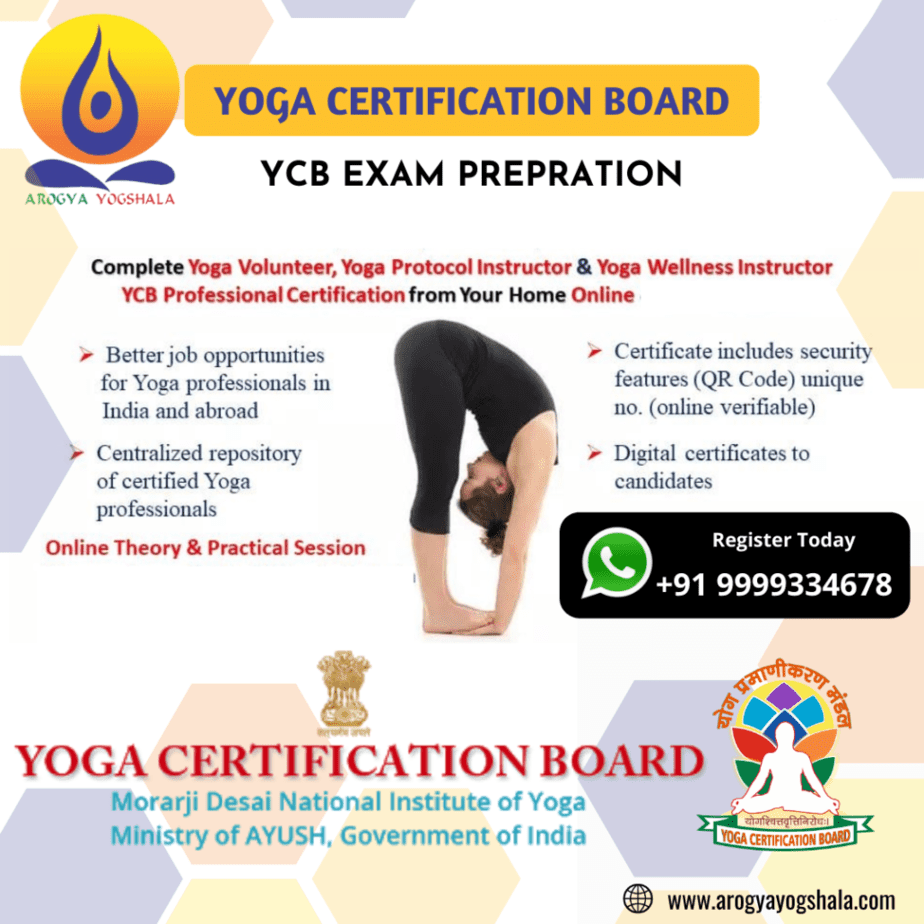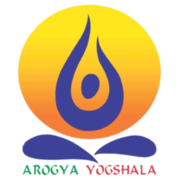
Become an International Certified Yoga Teacher
Under YOGA CERTIFICATION BOARD (YCB) Ministry of Ayush (Govt. of INDIA)
YCB Yoga Teacher Training Certification
Yoga Teacher Training
Join Our Upcoming Batch
YCB level 1 + level 2 Preparation
Yoga Protocol Instructor + Yoga Wellness Instructor
Offer fees ₹25,000
₹8,000
Recognized by:
YCB Govt. of India
YCB Yoga Teacher
Training Course
Anyone can enroll in the Yoga Teacher Training Course, regardless of yoga background. Yoga certifications like 200-Hours Yoga Training Certificate, 300-Hours Yoga Training Certificate, and YCB Certification will help you become a better yoga trainer and a full-fledged yoga instructor. Not just in India, this Yoga Teacher Training Certificate is open to everyone, regardless of age. Although our minimum age is 12 years old, the person should be proficient in either Hindi, English, or any other language that can be written as well as spoken.
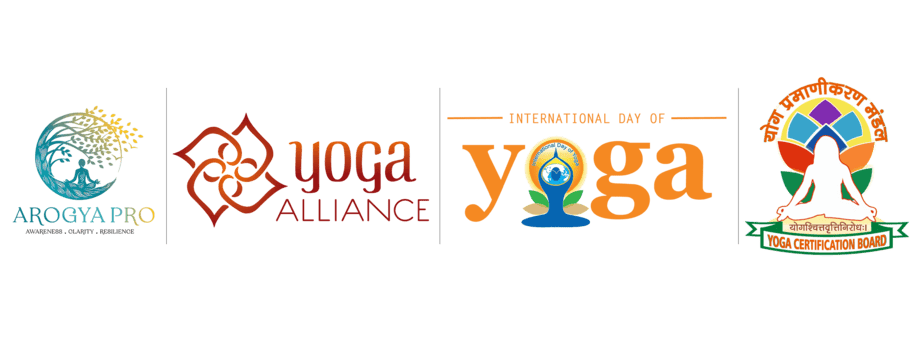
Zoom Live Session
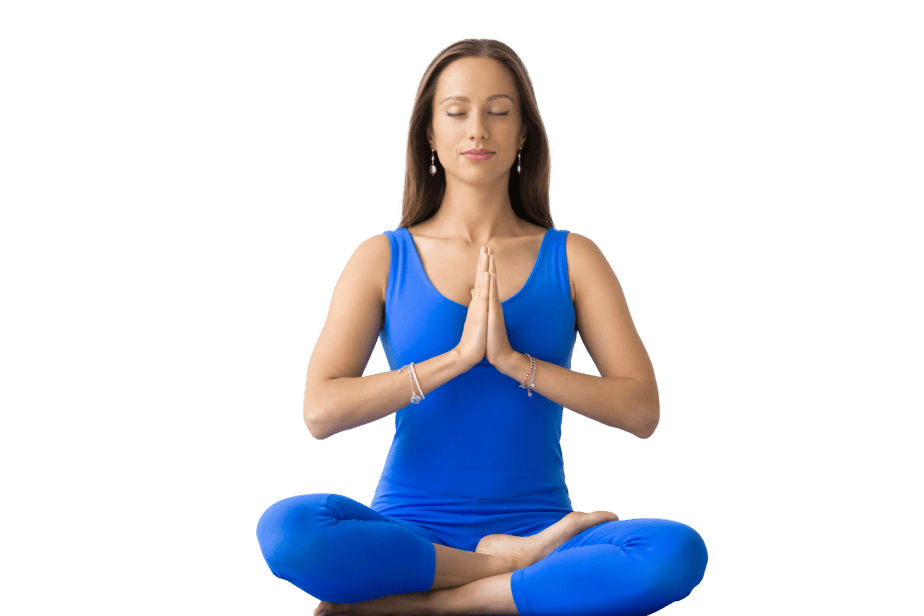
What is the duration of the Course?
The course duration depends on the choice of the course. YCB Certification Course is for 1 month, 200 Hours YTTC Course is for 2 months where as 300 Hours Course duration is for 3 months.
Monday to Friday-
Classes timing starts from :
Morning Classes
05:30 am to 07:30 am
7:30 am to 9:30 am
9:30 am to 11:30 am
11:30 am to 01:30 pm
Evening Classes
04:00 pm to 06:00 pm
06:00 pm to 08:00 pm
What We Will Teach
Practical
- Yoga Sukshma Vyayama (Micro Circulation Practices and how they affect us).
- Shula Vyayama (Macro Circulation Practices and how do they affect us).
- Surya Namaskara with Mantra and breathing pattern.
- 100 Yogasana & Asana Alignment with effect on the body.
- live Conceptual knowledge and Demonstration of (Yoga Mudra, Maha Mudra & Vipareetakarani Mudra)
- live Preparatory Breathing Practices & Pranayama and how do they affect our body
- complete knowledge of Bandha (Jalandhara Bandha, Uddiyana Bandha & Mula Bandha)
- Yoga Cleansing Techniques (Kapalbhati)& Yogic Shat Karma (Sutra Neti, Jala Neti, Vamana Dhauti & Vatakrama
- Prayer (Pranava, Hymns, Nishpatti Bhava & Universal prayers and yogic mantras)
- Meditation and Dhyana Sadhana
- Yog Nidra & Soham .
- Importance of subjective experience in daily Yoga practice.
- Applied yoga practice that is use full for masses
- how yoga teacher training can help student in life.
- how this yoga course will improve your life
Teaching Skills (Methods of Teaching Yoga)
- Essentials of good lesson plan: concepts, needs, planning of teaching Yoga (Shatkriya, Asana, Pranayama & practices leading to Dhyana).
- Teaching Yoga protocol to different groups (beginners, children, youth, women,old and others).
- Preparation for a Yoga class (before and during the class and precautions).
- Teaching methods with special reference to Yoga and yogic life
- Factors influencing Yoga teacher teaching.
- Class management in Yoga and therapy : its meaning and needs.
- Conducting yoga practical sessons: Precautions & Contraindications of practices)
- Models of ideal Yoga lesson plan.
- Need of teaching practice and its use in Yogic practice.
- Teaching Aids: Meaning and Need, Role of Language, Voice, Fluency, Clarity and Body language in an ideal presentation.
- Methods of teaching Yoga to an individual, small group and large group.
- Lecture cum demonstration in Yoga: Its meaning, importance and method of its Presentation 1.7 Lesson plan: Its meaning and need.
- Preparation of lesson plan in Yoga, Preparation of lesson plan for an individual and for a group.
- Presentation of lessons in specific Yogic practices: Kriya, Asana, Pranayama, and Dhyana.
- Assessment of a Yoga class (detection and correction of mistakes).
Teaching methodology
- Essentials of good lesson plan: concepts, needs, planning of teaching Yoga (Shatkriya, Asana, Pranayama & practices leading to Dhyana).
- Principles of teaching Yoga protocol to different groups (beginners, children, youth, women, Geriatric population, and special attention group).
- Preparation for a Yoga class (before and during the class).
- Teaching methods with special reference to Yoga.
- Factors influencing Yoga teaching.
- Class management in Yoga: its meaning and needs.
- Conducting yoga practical lessons: Precautions & Contraindications of practices).
- The Ideal Yoga Instructor.
- Ideal Yoga lesson plans.
- Need of teaching practice and its use in Yogic practice.
- Meaning and Need, Role of Language, Voice, Fluency, Clarity and Body language in an ideal presentation.
- Methods of teaching Yoga to an individual, small group and large group, corporate.
- Lecture cum demonstration in Yoga: Its meaning, importance and method of its Presentation 1.7 Lesson plan: Its meaning and need.
- Preparation of lesson plan in Yoga, Preparation of lesson plan for an individual and for a group.
- Presentation of lessons in specific Yogic practices: Kriya, Asana, Pranayama, and Dhyana.
- Assessment of a Yoga class (detection and correction of mistakes).
Theory
- Etymology, definitions (Patanjala Yoga Sutra, Bhagwad Gita & Kathopanishad), aim, obiectives and misconceptions.
- Its origin, history and development, past present and relevance in todays world.
- Guiding principles of Yoga practitioners and protocal.
- Introduction to Samkhya and Yoga Darshana.
- Life sketches and teachings of Yoga masters (Maharishi Ramana, Shri Aurobindo Swami Vivekananda, Swami Dayananda Saraswati and other famous yogis).
- Principles of Yoga (Triguna, Antahkarana-chatustaya, Tri-Sharira/ Panchakosha).
- Principles of Yoga and practices of healthy living.
- Principles and Practices of Jana Yoga, Bhakti Yoga, Karma Yoga.
- Concept and principles of Shatkarma: Meaning, Types, Principles and their significance in Yoga Sadhana.
- Concept and principles of Yogasana & Pranayama : Meaning, definition, types and their significance in Yoga Sadhana.
- Dhyana and its significance in health and well being.
- Introduction to Yogic relaxation techniques with special reference to Yoga Nidra.
- Introduction of Tri Bandha and their health benefits .
- Yoga Kathopnishad, Prashanopanisha, Tattriyopnishad with special emphasis on Panchakosha Vivek and Ananda Mimamsa.
- The Concept of Sthitaprajna, Bhakti, Karma and Dhyana in Bhagavad Gita. .
- the Concept of Chitta, Chitta Bhumi, Chitta Vritti, Chitta Vikshepa, Chittaprasadanam and their relationship with wellness.
- Concepts of Nadis, Prana and Pranayama for Subjective experiences.
- Study of Patanjal Yoga Sutra including selected sutras from following chapters (I- 1 to 12, 11- 46 – 51, I||- 1 to 4).
- Introduction of Bhagavad Gita including memorization of selected Slokas (Chapter II-47, 48, 49, 50 and 70).
- Concept of healthy living in Bhagavad Gita (Ahara, Vihara, Achara, Vichara).
- Introduction to Prasthanatrayee, Purushartha Chatushtaya and goal of life.
- Hatha Yoga: Its parampara, knowledge of basic Yoga texts (Hatha Pradipika and Gherand Samhita). Relationship between Hatha yoga and Raja Yoga.
- Knowledge and know how of Hatha Yoga practices for wellness (Shatkarma, Asanas, Pranayama, Mudra, Nadaanusandhana).
- concept of mental hygiene: Maître, Karna, Mudita & Upeksha).
- Concept of bhavas (Dharma, Jana, Vairagya, Aishvarya) and their relevance in well being of humans .
- Salient features and contra indications of Yoga practices for well being (as per the practical syllabus of the course).
Therapy
- How to tackel Diabetes, Cholesterol, High B.P, Low B.P, Thyroid. Indigestion, Constipation, Gases, Acidity, Acid Reflux, Sleeping disorder, Back Pain, Knee Pain, Arthritis, Parkinson, Asthma, Sciatica, Hamstring, Varicose, PCOD & PCOS.
- How Yoga can be helpful in prevention of metabolic and respiratory disorders.
- Concept of stress and Yogic management of stress and its consequences.
- FlexAsility, Strength, Stamina & Immune development and what all the natural ways to improve all these.
- Muscle development, and Weight Loss & Weight Gain .
- Brief introduction to human body and nine major systems of human body and human anatomy.
- Basic functions of major systems of human body and homeostasis.
- Introductions to sensory organs (Eyes, Nose, Ears, Tongue and Skin) and how do they work .
- Knowledge of common diseases; their prevention and management through Yoga.
- Knowledge and role of Yoga in the management of non communicable diseases.
- Importance of psychosocial environment for health and wellness.
Ahar
- Rajshik, Tamasic, Sattvik kinds of food
- The Concept of Tridoshas, Sapta Dhatu, Agni, Vayu and Mala; their role in wellness and cure of them.
- Concepts and principles of Aahara (Diet) in Hathapradipika and Bhagawadgita and other ancient text (Mitahara and Yuktahara).
- Concepts of Dinacharya and Ritucharya their importance in well being of human civilsation.
- Importance of Ahara, Nidra and Brahmacharya in and importance of brahmcharya in modern life well being.
Course Attendance Criteria
There will be test after the completion of the batch to sit in the batch student needs to have at least 75% attendance in the class.
Student should have submitted all the project and on the time.
Examination include MCQ for theory & practical exam.
Students should maintain decorum in the class.
Certificates

Benefits
1
Meet Like-Minded People
2
Give Back To Your Community
3
Block Out Consistent Time for Your Practice
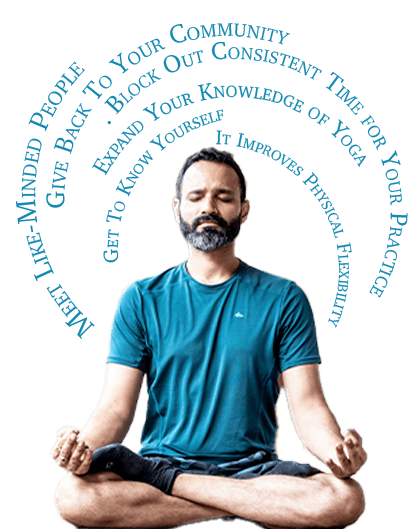
4
Expand Your Knowledge of Yoga
5
Get To Know Yourself
6
It Improves Physical Flexibility
Lead Teachers
Our Faculty

Prabhakar Vats

Samriti Sharma

Amrita

Pritesh Hirve



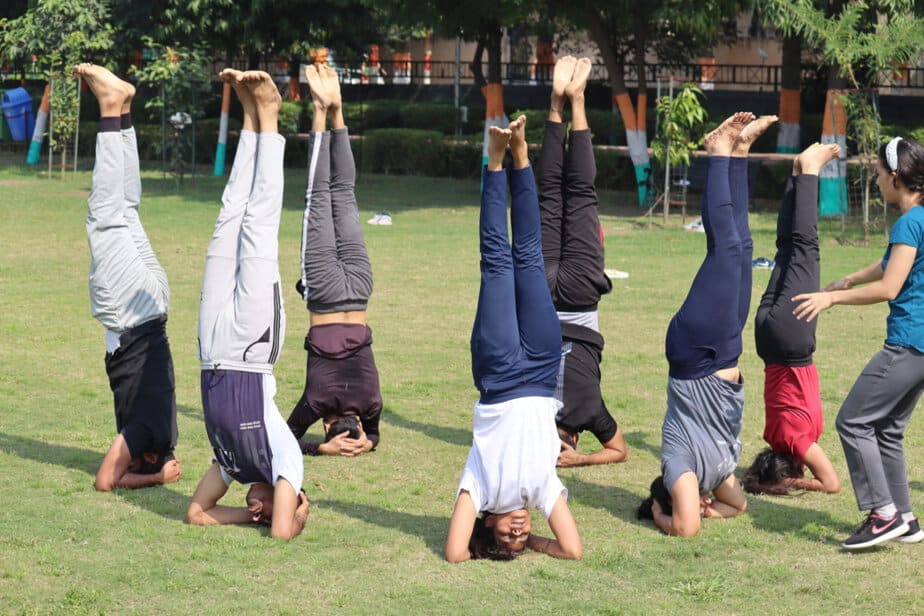
About Us
We, the team of yogis, wanted to make significant changes in the yoga community after years of practise in Yoga and Meditation. We have been teaching yoga to the world for the past ten years, passing on lost authentic yoga knowledge.
Our primary goal in the previous year was to teach “yoga as it is” which is the knowledge of the ancients yogis. Kids yoga, prenatal and postnatal yoga, as well as 200 and 300 Hour Teacher Training Programmes, are the courses in which we master ourselves.
As yoga practitioners, we are a group of yogis with the mission make world a better and a healthier place for every species As rightly said in Geeta Vasudhaiva Kutumbakam (The World is One Family). oom
Why Choose Us
- Only institute who provides authentic yoga knowledge.
- Online yoga teacher training course provides best in class yoga teachers.
- Best syllabus of yoga teacher training that covers all the aspect of the syllabus
of yoga teacher training. - Program gives real life training experiencer with live training.
- Teach real students after the training demonstration batches.
- Yoga certificate course provide free life coach sessions with yogis who will guide you through life
work with us after completion of the batch. - Best price with best knowledge
Client Testimonials



Now Make your career as a yoga teacher

Register Yourself for YCB Certified Yoga teacher under Ministry of AYUSH Govt. of India.
( YOGA CERTIFICATION BOARD )
for
Level-1 : Yoga Protocol Instructor
Level-2: Yoga Wellness Instructor
Level-3: Yoga Teacher & Evaluator
Go ahead for further information of Level 1, Level 2, Level 3
